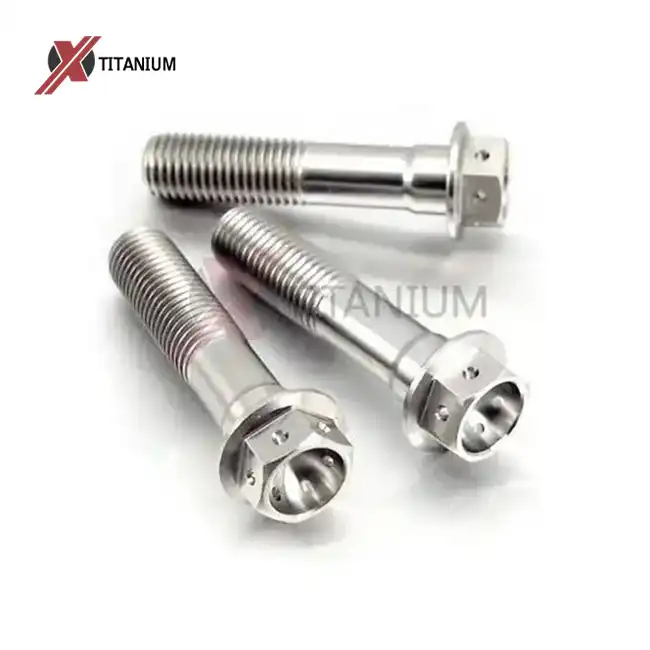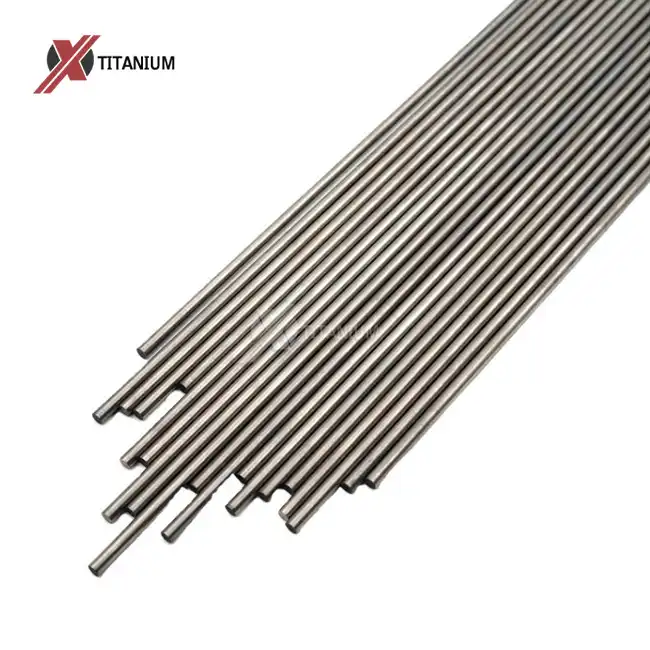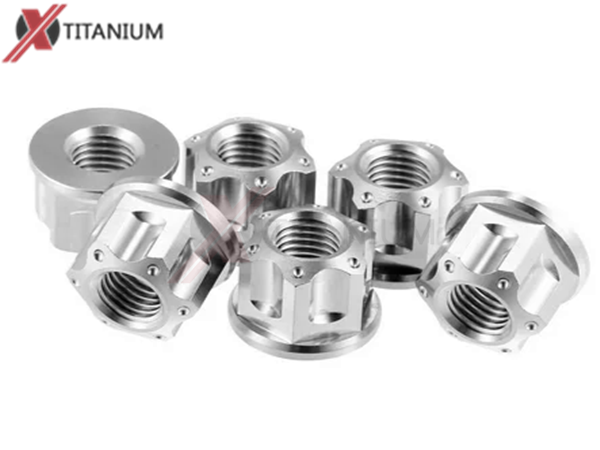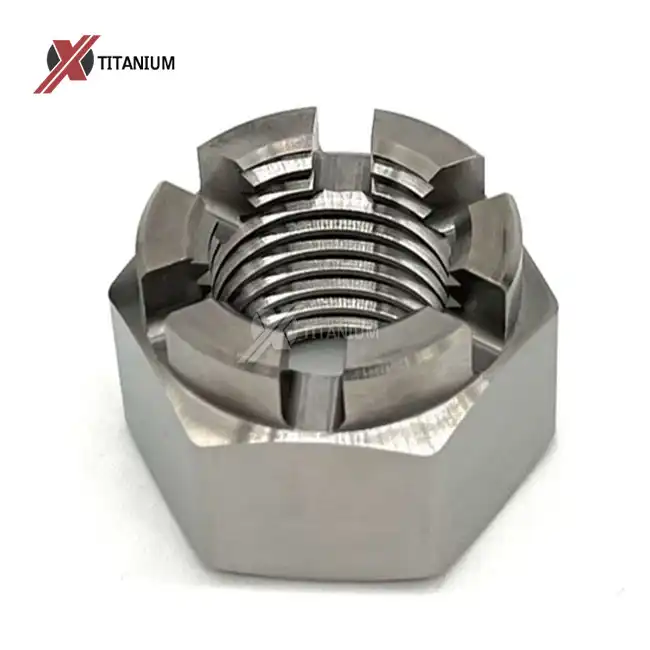Understanding the distinction between titanium alloys and titanium fasteners is crucial for procurement professionals in high-performance industries. Titanium alloys refer to the base materials - pure titanium combined with elements like aluminum and vanadium to enhance specific properties. Titanium fasteners, including titanium alloy bolts, represent the manufactured components created from these alloys for joining applications. While Titanium Fasteners are the end products, titanium alloys serve as the foundation materials that determine the fastener's performance characteristics, corrosion resistance, and mechanical properties in demanding aerospace, medical, and industrial applications.
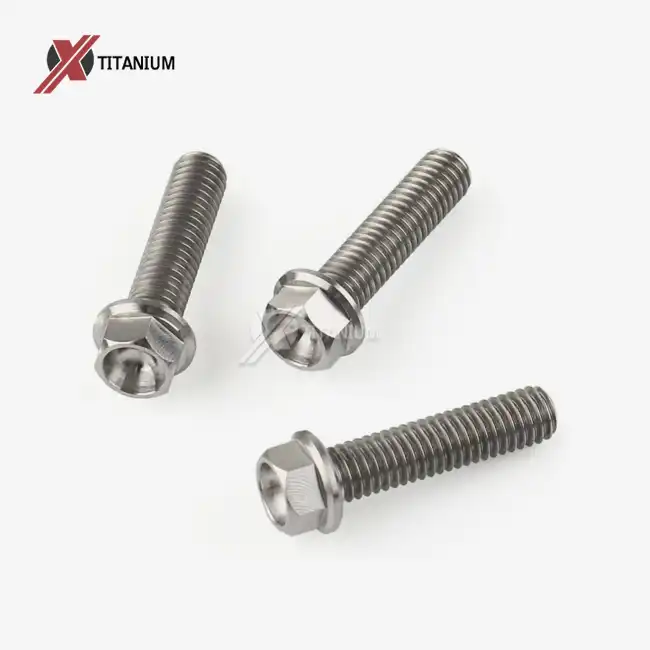
Understanding Titanium Alloy Composition and Properties
Titanium alloys contain carefully balanced combinations of titanium with other metals to achieve specific performance targets. The most common aerospace fasteners utilize Grade 5 (Ti-6Al-4V), which includes 6% aluminum and 4% vanadium.
This alloy composition delivers remarkable mechanical properties that exceed pure titanium capabilities:
- Tensile strength: 895-930 MPa compared to pure titanium's 240-550 MPa
- Yield strength: 828-869 MPa versus pure titanium's 170-485 MPa
- Density: 4.43 g/cm³, significantly lighter than steel at 7.85 g/cm³
- Operating temperature: Maintains strength up to 400°C continuously
The alloy composition directly influences corrosion resistance, with titanium naturally forming a protective oxide layer. This oxidation resistance proves essential in marine engineering and chemical processing applications. If you need materials for high-temperature aerospace applications, then Ti-6Al-4V alloys are more suitable than pure titanium due to superior heat resistance and structural integrity.
Titanium Fastener Manufacturing and Applications
Titanium alloy bolts undergo precision engineering processes that transform raw alloy materials into specialized components. CNC machined fasteners achieve tolerances within ±0.005 inches, meeting strict aerospace standards.
Manufacturing processes include:
- Material selection based on application requirements
- CNC machining for precise dimensions and threading
- Surface treatment including anodizing or nitriding
- Quality inspection following AS9100 standards
- Certification and traceability documentation
Industrial applications span multiple sectors where fastener reliability becomes critical. Aerospace manufacturers require bolts capable of withstanding extreme stress cycles while maintaining lightweight characteristics. Medical device companies prioritize biocompatibility for surgical instruments and implants.
Petrochemical facilities depend on corrosion resistance for pressure vessels and heat exchangers. Marine engineering projects utilize these fasteners in offshore platforms where saltwater exposure demands exceptional durability. If you need fasteners for corrosive environments, then specialized titanium fasteners with appropriate surface treatments are more suitable than standard steel alternatives.
Key Performance Differences: Alloy vs Fastener Considerations
Material properties differ significantly between raw titanium alloy bolts and finished fasteners due to manufacturing processes and design specifications. Cold working during fastener production can increase strength by 10-15% while potentially reducing ductility.
Critical performance factors include:
| Property | Raw Titanium Alloy | Finished Fastener |
|---|---|---|
| Tensile Strength | 895-930 MPa (Ti-6Al-4V) | 930-1000 MPa (cold worked) |
| Fatigue Life | Base material limit | Enhanced through surface treatment |
| Stress Concentration | Uniform material | Thread geometry dependent |
| Machinability | Requires specialized tooling | Pre-machined to specification |
Load-bearing capacity varies based on fastener design and thread engagement. Proper bolt tensioning ensures optimal performance while preventing stress corrosion cracking in challenging environments. Metal fatigue resistance improves through controlled surface treatments like shot peening or nitriding. These processes create compressive surface stresses that inhibit crack initiation and propagation.
If you need components for high-cycle applications, then fasteners with enhanced surface treatments are more suitable than untreated alloy materials.
Cost Analysis and Procurement Considerations
Economic factors significantly influence material selection decisions in industrial procurement. Raw titanium alloy costs typically range from $15-35 per kilogram, while finished fasteners command premium pricing due to machining complexity.
Procurement considerations include:
- Material waste: Machined fasteners eliminate in-house processing waste
- Lead times: Custom fasteners require 8-12 weeks versus 2-4 weeks for alloy stock
- Quality assurance: Certified fasteners include complete traceability documentation
- Volume economics: Large orders benefit from direct alloy purchasing
- Technical support: Fastener suppliers provide application engineering assistance
Long-term value extends beyond initial acquisition costs. Titanium fasteners deliver extended service life, reduced maintenance requirements, and enhanced system reliability compared to alternative materials.
Thermal expansion coefficients closely match aluminum structures, minimizing stress concentrations during temperature cycling. This compatibility proves essential in aerospace applications where precision engineering demands consistent performance.
If you need cost-effective solutions for high-volume production, then establishing partnerships with specialized titanium fastener suppliers proves more suitable than developing in-house capabilities.
Quality Standards and Certification Requirements
Certification requirements differ substantially between raw materials and finished fasteners in regulated industries. Titanium alloys require mill test certificates documenting chemical composition and mechanical properties.
Fastener certifications encompass additional requirements:
- Dimensional inspection reports confirming thread specifications
- Tensile testing verification for each production lot
- Surface treatment documentation including coating thickness
- Traceability records linking finished products to source materials
- Third-party inspection certificates for critical applications
Engineering standards such as ASTM F467 for titanium fasteners specify minimum mechanical properties and testing procedures. Aerospace applications require additional compliance with AS9100 quality management systems.
Medical device manufacturers must verify biocompatibility through ISO 10993 testing protocols. These standards ensure patient safety for implantable devices and surgical instruments.
Quality control systems at leading manufacturers include statistical process control monitoring and automated inspection equipment. Real-time data collection enables immediate correction of process variations before defective products reach customers.
If you need certified materials for regulated industries, then working with AS9100 or ISO 13485 certified fastener manufacturers is more suitable than managing complex certification processes internally.
Chuanglian's Premium Titanium Alloy Bolts: Your Trusted Manufacturing Partner
Selecting the right titanium alloy bolts manufacturer requires careful evaluation of technical capabilities, quality systems, and delivery performance. Baoji Chuanglian New Metal Material Co., Ltd. combines over ten years of titanium processing expertise with comprehensive manufacturing capabilities.
Chuanglian's Competitive Advantages:
- Advanced Manufacturing: Dozen CNC machine tools ensure precision machining within ±0.005" tolerances for aerospace-grade fasteners
- Material Expertise: Located in Baoji City, the "Titanium Capital," providing direct access to premium raw materials and specialized processing knowledge
- Quality Assurance: Strict quality control systems from raw material to finished products, with complete traceability documentation meeting international standards
- Surface Treatment Capabilities: Comprehensive anodizing, nitriding, and polishing services delivering custom colors including titanium natural, gold, blue, green, purple, black, and rainbow finishes
- Technical Support: Experienced engineering team provides application consultation and material selection guidance for complex projects
- Proven Track Record: Products successfully tested by global companies across aerospace, medical, petrochemical, and marine engineering sectors
- Customization Flexibility: Tailored solutions for specific dimensions, threads, and specifications meeting unique customer requirements
- Comprehensive Product Range: Complete titanium product portfolio including rods, wire, plates, tubes, flanges, and machined components
- Delivery Reliability: Established supply chain management ensuring consistent lead times and quality consistency
- Global Experience: Extensive export experience serving international markets with culturally sensitive customer service
Procurement professionals seeking titanium alloy bolts supplier partnerships benefit from Chuanglian's comprehensive approach to customer support. Technical consultation helps optimize material selection while quality documentation streamlines approval processes.
Our commitment to continuous improvement includes regular equipment upgrades and technician training programs. This investment ensures manufacturing capabilities evolve with advancing industry requirements and technological developments.
Conclusion
The distinction between titanium alloy bolts and titanium fasteners centers on material state versus application-ready components. Raw titanium alloys provide the foundation materials with specific chemical compositions and mechanical properties. Titanium fasteners represent the engineered solutions that harness these material advantages for critical joining applications.
Procurement decisions should consider total cost of ownership, including material performance, processing requirements, and long-term reliability. Partnering with experienced manufacturers like Chuanglian ensures access to both technical expertise and quality assurance systems essential for demanding applications across aerospace, medical, and industrial sectors.
Ready to discuss your specific titanium fastener requirements? Contact our technical team to explore how Chuanglian's expertise can support your next project. Reach out to us at contact us at info@cltifastener.com and djy6580@aliyun.com for detailed technical specifications and competitive quotations.
References
1. Boyer, R.R. "An Overview on the Use of Titanium in the Aerospace Industry." Materials Science and Engineering: A, vol. 213, 1996, pp. 103-114.
2. Lutjering, G. and Williams, J.C. "Titanium: Engineering Materials and Processes." 2nd Edition, Springer-Verlag, Berlin, 2007.
3. American Society for Testing and Materials. "ASTM F467-19: Standard Specification for Nonferrous Nuts for High Temperature or High Strength Service." ASTM International, West Conshohocken, PA, 2019.
4. Donachie, Matthew J. "Titanium: A Technical Guide." 2nd Edition, ASM International, Materials Park, OH, 2000.
5. Peters, M., Kumpfert, J., Ward, C.H., and Leyens, C. "Titanium Alloys for Aerospace Applications." Advanced Engineering Materials, vol. 5, no. 6, 2003, pp. 419-427.
6. Rack, H.J. and Qazi, J.I. "Titanium Alloys for Biomedical Applications." Materials Science and Engineering: C, vol. 26, no. 8, 2006, pp. 1269-1277.
